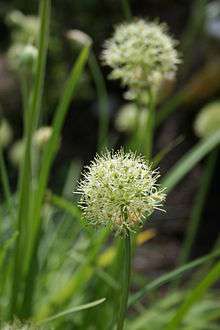Allium hookeri
| Hooker chives 宽叶韭 kuan ye jiu | |
|---|---|
 | |
| Scientific classification | |
| Kingdom: | Plantae |
| Clade: | Angiosperms |
| Clade: | Monocots |
| Order: | Asparagales |
| Family: | Amaryllidaceae |
| Subfamily: | Allioideae |
| Tribe: | Allieae |
| Genus: | Allium |
| Species: | A. hookeri |
| Binomial name | |
| Allium hookeri Thwaites | |
| Synonyms[1] | |
|
Allium tsoongii F.T.Wang & Tang | |
Allium hookeri is a plant species native to India, Sri Lanka, Myanmar (Burma), Bhutan, and southwestern China (Sichuan, Tibet and Yunnan). Common names include Hooker chives, Phulun Zung (in India), 宽叶韭 kuan ye jiu in China, etc. The plant is widely cultivated outside its native range, and valued as a food item in much of South and Southeast Asia.[2][3]
Allium hookeri produces thick, fleshy roots and a cluster of thin bulbs. Scapes are up top 60 cm tall. Leaves are flat and narrow, about the same length as the scapes but only 1 cm across. Umbels are crowded with many white or greenish-yellow flowers.[2][4][5][6]
Uses
Allium hookeri is widely cultivated outside its native range, and valued as a food item in much of South and Southeast Asia.
References
- ↑ The Plant List
- 1 2 Flora of China v 24 p 174 宽叶韭 kuan ye jiu Allium hookeri
- ↑ Flowers of India, Hooker chives, Allium hookeri
- ↑ Thwaites, George Henry Kendrick. 1864. Enumeratio Plantarum Zeylaniae, an enumeration of Ceylon plants, p 339.
- ↑ F.T.Wang & Tang. 1937. Bulletin of the Fan Memorial Institute of Biology; Botany. Peiping 7: 292. 1937
- ↑ Grierson, A. J. C. & D. J. Long. 1984. Flora of Bhutan including a record of plants from Sikkim. Thimphu.